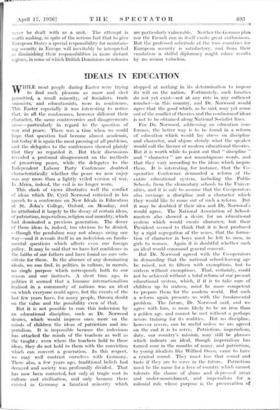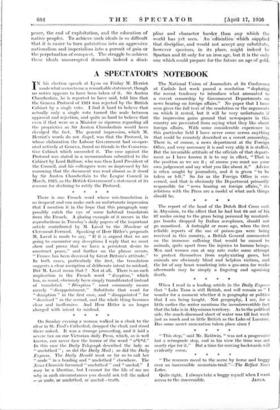IDEALS IN EDUCATION
WHILE most people during Easter were trying to find such pleasure as snow and sleet permitted, a small minority, of Socialists, trade unionists, and educationists, were in conference. This Easter especially it was interesting to notice that, in all the conferences, however different their character, the same controversies and disagreements nrose—partieularly in regard to the question of war and peace. There was a time when we could hope that question had become almost academic, but today it is.again the most pressing of all problems, and the delegates to the conferences showed plainly that they so regarded it. But their discussions revealed a profound disagreement on the methods of preserving peace, while the delegates to the Independent Labour Party Conference doubted characteristically whether the peace we now enjoy was any more than a lightly veiled version of war. In Africa, indeed, the veil is no longer worn.
This clash of views illustrates well the conflict of ideas which Dr. Cyril Norwood criticised in his speech to a conference on New Ideals in Education at St. John's College, Oxford, on Monday, and he attributed it largely to the decay of certain ideas, of patriotism, imperialism, religion and morality, which had dominated a previous generation. The decay of those ideas is, indeed, too obvious to be denied, 7–though the pendulum may not always swing one way—and it reveals itself in an indecision on funda- mental questions which affects even our foreign policy. It may be said that we have lost confidence in the faiths of our fathers and have found no sure sub- stitute for them. In the absence of any dominating ideals, we can find, in politics, in culture, in morals, no single purpose which corresponds both to our reason and our instincts. A short time ago, in politics it seemed that a humane internationalism realised in a community of nations was an ideal on which everyone could agree, but the events of the last few years have, for ,many people, thrown doubt on the value and the possibility even of that.
But it is not possible to cure this indecision by an educational discipline, such as Dr. Norwood desires, which would impress once more on the minds of children the ideas of patriotism and im- perialism. It is impossible because the indecision has attacked the minds of the teachers as well as the taught ; even where the teachers hold to these ideas, they do not hold to them with the conviction which can convert a generation. In this respect, we may well contrast ourselves with Germany. There also, a few years ago, traditional beliefs had decayed and society was profoundly divided. That has now been corrected, but only at tragic cost in culture and civilisation, and only because there existed in Germany a fanatical minority which stopped at nothing in its determination to impose its will on the nation. Fortunately, such fanatics do not yet exist—not at any rate in any sufficient number—in this country, and Dr. Norwood would agree that the good which, as he said, may yet come out of the conflict of theories and the confusion of ideas is not to be obtained along National Socialist lines.
For Dr. Norwood, addressing an education con- ference, the better way is to be found in a reform of education which would lay stress on discipline and character, and abjure sternly what the speaker would call the licence of modern educational theories. But it is worth while to point out that " discipline " and " character " are not unambiguous words, and that they vary according to the ideas which inspire them. It is interesting, for instance, that the Co- operative Conference demanded a reform of the entire educational system, including the Public Schools, from the elementary schools to the Univer- sities, and it is safe to assume that the Co-operators also envisage a discipline and a character which they would like to come out of such a reform. But it may be doubted if their idea and Dr. Norwood's would agree. The National Association of School- masters also showed a desire for an educational system which would create character, but their President seemed to think that it is best produced by a rigid segregation of the sexes, that the forma- tion of character in boys must be left to men, in girls to women. Again it is doubtful whether such an ideal would command general consent.
But Dr. Norwood agreed with the Co-operators in demanding that the national school-leaving age be raised, not to fifteen with exemptions, but to sixteen without exemptions. That, certainly, could not be achieved without a total reform of our present educational system, which, if it is to take care of children up to sixteen, must be more competent to prepare them for the modern world. But such a reform again presents us with the fundamental problem. The future, Dr. Norwood said, and we agree with him, is more likely to be an iron than a golden age, and cannot be met without a perhaps severe training for its realities. But no discipline, however severe, can be useful unless we arc agreed on the end it is to serve. Patriotism, imperialism, duty, our country's mission, may still be phrases which indicate an ideal, though imperialism has turned sour in the mouths of many, and patriotism, to young idealists like Wilfred Owen, came to have a cynical sound. They must lose that sound and taste if they are to serve in the future. Patriotism must be the name for a love of country which cannot tolerate the shame of slums and depressed areas and under-nourishment, and imperialism for a colonial rule whose purpose is the preservation of peace, the end of exploitation, and the education of native peoples. To achieve such ideals is so difficult: that it is easier to turn patriotism into an aggressive nationalism and imperialism into a pursuit of gain or the perpetuation of conquest. The struggle to achieve these ideals uncorrupted demands indeed a disci- pline and character harder,..than • any _which the world has Yet seen. An '"eafiCati6nf 'Whieh supplied that discipline, and would not accept any substitute, however specious, in its place, might indeed be Spartan and fit only for an iron age, but it is the only one which could prepare for the future an age of gold.













































 Previous page
Previous page